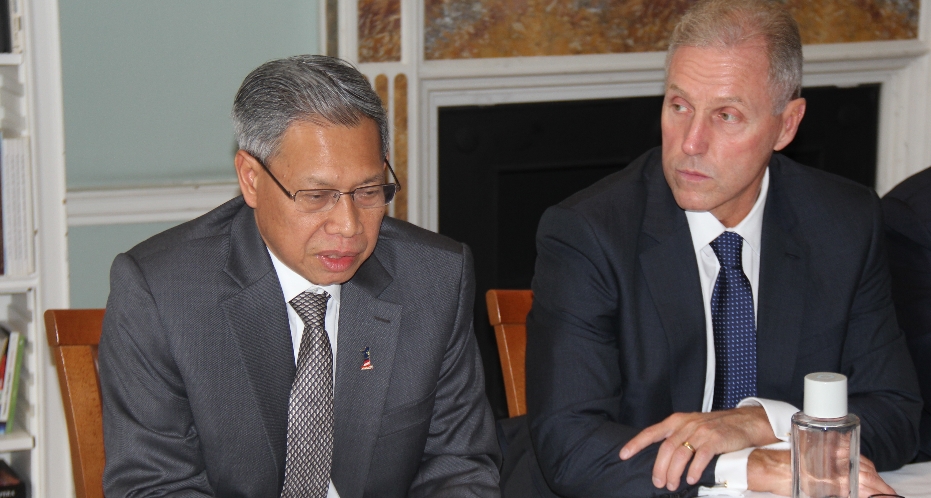Driving commercial and political engagement between Asia, the Middle East and Europe
Driving commercial and political engagement between Asia, the Middle East and Europe
Driving commercial and political engagement between Asia, the Middle East and Europe

Mustapa Mohamed, Malaysia’s Minister for International Trade & Industry, spoke at a private briefing for Asia House corporate members this morning. Following the briefing Mr Mohamed gave an exclusive interview during which he candidly answered questions about the current state of Malaysia’s economy and what lies ahead given the recent plunge of the ringgit, stock market turmoil and the political corruption scandal over 1Malaysia Development Berhad (1MDB).
Mr Mohamed was keen to make clear his confidence that Malaysia would experience growth of five per cent in the current year, and maintain that growth rate in coming years. “The last six months have been challenging politically,’ he conceded, “but in recent weeks there’s been a return of confidence in the government and that’s had to do with the measures that have been put in place.”
He explained that the markets had become a lot more volatile in recent months, in particular the currency market and the stock market, but that increasing exports of electrical components compensated for the reduction in earnings from oil, gas and commodities. He expressed concern at the seemingly unshakeable perception that Malaysia was overly dependent on commodities, insisting that this was simply not the case. “Our fundamentals remain strong,” he said. “We have a good track record. Inflation is under control. Unemployment is slow. We are of course facing some challenges but we believe long-term, our prospects for growth in the next five years remain good.”
Mr Mohamed stated that current initiatives and further measures to be announced over the coming months would be enough to restore confidence in the leadership. “We’ve set up the economic committee, which started work only about two weeks ago. What came out last Monday were short-term measures. Some investors are going to be benefiting from the currency depreciation but the 2016 budget (tabled on 23 October) will see the medium to longer-term measures and incentives boost investment and exports and ensure that our economy continues to grow.”
He said that the government has 134 members of parliament and 88 in opposition. “We believe that the government continues to be strong and there’s no danger of further weakening.” He added, “there are some political challenges and people are free to express their views but we believe our government is getting more support in recent weeks and that’s important.” In respect of the 1MDB, he said investigations were on-going and he hoped to find closure on this issue by the end of this year or early next year. Once it was out of the way, he believed they would be able to further enhance confidence, political stability and also economic resilience.
Malaysia is participating in negotiations for the Trans-Pacific Partnership Agreement (TPP) and Mr Mohamed was asked about the issues that might stand in the way of a signed agreement. He explained that there were two sets of issues: those that are important to some developed economies and those that are relevant to developing countries like Malaysia. “We have some issues on stable enterprises, these are government linked companies and the standard of disclosure, intellectual property rights and the price of medicine,” all of which are still being negotiated, he explained.
Was he confident that his government would be able to push the deal through at the end of the negotiations? His role, he said, was to negotiate the best steps once the terms are agreed by all countries. “It’s got to go to Parliament and as a government, of course we have to convince members of parliament. If the parliament is comfortable that the people of Malaysia can accept this agreement, then it goes through.” He was keen to make clear that he was speaking only about the process in Malaysia. Other countries will have their own procedures to follow, he said.
He was upbeat about the future and the nearing realisation of the ASEAN Economic Community (AEC). “We have been an open economy dependent on trade, investment, tourism,” he said. “As barriers to trade come down, as movement of groups, capital, goods and investments become free-er, that will benefit Malaysia.”
The only barriers that he could see were the non-trade barriers. “You have Schengen,” he said. “We are a different model from the EU. We operate with consensus. If one country doesn’t agree, that’s it. That idea will not fly. This is called the ASEAN way. People might say that we are moving slowly but we are at three different levels of development so the chances of what we are achieving at the end of this year is free-er. Not free. A free-er flow of labour, capital and goods. In Europe, you have free flow. Freer-er, that’s a very important word.”
Mr Mohamed ended the interview by celebrating Malaysia’s influence as the 2015 chair for ASEAN. He is ambitious for the future and for the region. “We are in the driving seat, playing a leadership role, and we are playing a very constructive role in ensuring that by 2015 we can declare ASEAN a community. We are going to be more open, more transparent, and we are going to achieve greater connectivity. We want to make our centre the most dynamic region in the world.”
Sonya Thomas is a freelance journalist based in London.
We’re holding a conference, UK-ASEAN Dialogue, on Tuesday 13 October that will explore the key trends shaping the ASEAN region and discuss the implications for businesses. Click here for more information.
To read an exclusive interview Asia House web editor held with Hugo Swire, Minister of State at the Foreign and Commonwealth Office, following his recent trip to Myanmar, click here.
